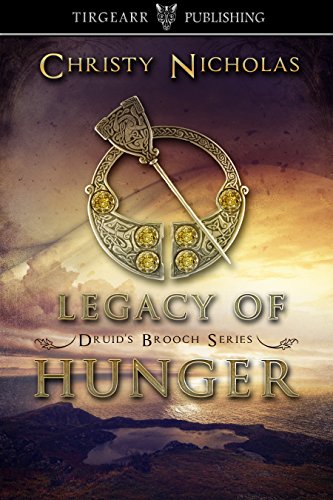A compelling tour of 1840s Ireland
288 pages, $4.99 on Kindle, historical fiction/fantasy.
Author Christy Nicholas obviously loves Ireland, Irish legends and the period of history she has chosen to write about, the 1840s in Ireland, the time of the potato blight and much suffering in the Irish common people. Whenever her clean, spare prose turned to Irish faery tales, or descriptions of the land and people, I could see and feel a warm glow on the page as her love for the time and people shone through. There is much to enjoy and savor within these pages, especially for those drawn to the period and the place.
And so I settled in for the story, now on a ship, now in a bumpy carriage, now running from men who would do heroine Valentia harm. Sad things happened, tragic circumstances arose. These tragic events did not rise to the level of drama, in the sense of a purposeful hero pursuing a meaningful end and meeting powerful resistance. They were just sad, tragic distractions on a single-minded journey.
Valentia had goals and motivations aplenty, and Nicholas crafted in her a subtle and nuanced character who did grow and evolve on her bumpy journey. And yet, as a reader, although I rather liked Valentia, carefully drawn flaws and all, and I was perfectly happy to join her on that journey, eventually I found myself waiting for The Story, the heart of her journey, to begin, and it never did, or not in a satisfying way for this reader. When we arrived, rather abruptly, and in strangely summarized form, at the end, I was startled to discover no real hook into the next book in the series, where perhaps The Story proper could begin now that the world and main character had been so carefully drawn.
I struggle to explain what was missing for me, for Valentia did all the things a good hero should do, persisting in the face of obstacles, developing kindness and compassion to overcome defects in her upbringing and blinkers in her world view. She was active, not passive. She made the choices about her journey, not the men or the servants or the mentors she met on her path. If I attempt, imperfectly, to summarize my feeling as a reader, it is that I was a passenger on someone else’s long and circuitous and often colorful and interesting journey, but I never knew where we were going or precisely why, and neither did Valentia, other than her quest to find an old brooch. And that is a terrible summary, for it was clear from the beginning that we were going to Ireland to search for grandmother’s brooch, which may or may not have magical powers, and that is precisely what we did, no matter the many obstacles. I just found myself wanting more powerful motivation than a comfortably raised young woman’s whim to go in search of an old brooch.
I’ve heard it said that “Satisfaction is Reality divided by Expectations,” and perhaps therein lies my personal difficulty with this finely wrought yet ultimately dissatisfying work, the high expectations I brought to the read. I was never quite sure what to expect, although I had been told to expect a historical fantasy, a genre I much enjoy. One of the challenges of the genre is the balance between historical and fantastical elements. Nicholas went heavy on the historical side, which I quite enjoyed by the way, and the care she took in her research shows, with slight hints of the fantasy that burst into full view only at the very end. That is fine, and a perfectly acceptable decision for a creator to make, and yet I found it a bit confusing as a reader, for I found myself waiting for the “fantasy stuff’ to begin and start driving the story but it never really did. The author created a kind of glass pane and distance between the reader and the experience of magic, in that the legends were told and described, as though a scholar were explaining to the reader bits of Irish faery legend, rather than allowing the reader to experience them in person as occurred only very occasionally in the book. Rather we were treated to small bits of Irish faery legends here and there in conversation and a few magical moments, but the fantasy never really took root but felt pasted on at the end. I wonder if a stronger choice in either direction might have been less confusing for readers and avoided some of that impatient waiting feeling I experienced, either light up the fantasy side faster and bigger earlier, or tell a straight historical fiction tale without the magic.
Recommendation: for readers who wish to learn more about Ireland of the 1840s, this is a thoroughly researched and lovingly drawn sketch of Ireland in that time. It lacks drama as a story, although the journey is an interesting and informative one, and the main character appealing in her very human mix of virtues and flaws. I am concerned that more fantasy-oriented readers will find the fantasy dosage less than their hopes and historical fiction readers may find the fantasy altogether too much.

2 thoughts on “LEGACY OF HUNGER”
Comments are closed.